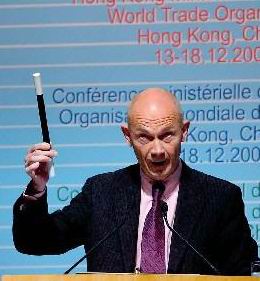
WTO Director-General Pascal Lamy officially opened
the HK meeting yesterday.-Xinhua
If you don't go into the tiger's cave, how can you get its cub?
WTO Director-General Pascal Lamy quoted this ancient Chinese saying yesterday
to impress upon trade negotiators to be bold, open-minded and prepared to take
some risks if there has to be a chance of success.
He was addressing the opening ceremony of the sixth WTO ministerial meeting,
which opened amid low expectations of breakthroughs and protests.
Trade ministers from 149 member economies, however, found it would be a tough
job to resolve the deep divisions between rich and poor nations when they
started the six-day talks towards an eventual global treaty that would cut trade
barriers.
The meeting aims to wrap up the Doha Round of negotiations, which started in
Qatar's capital in 2001 and are meant to pay particular attention to poor
nations' trade concerns.
Waving a large magic wand he said he had been given, Lamy warned: "We all
understand the need of each and every delegation to take home some gain from
trade negotiations. But for that, some risks must be taken.
"Repeating long-known positions, using negotiators' language, refusing to
understand the reasons of counterparts and avoiding any risks including
political risks will get us nowhere."
A record 11,000 people attended the meeting yesterday, with 5,800 delegates
from WTO member economies, 3,200 media and 2,167 representatives from
non-governmental organizations (NGOs).
John Tsang, chairman of the conference, said the meeting aims to build a
platform for the successful conclusion of the Doha Development Agenda next year.
"Even more importantly, the ministers must give a clear direction on how we
intend to move forward after the Hong Kong conference, so that full modalities
on agricultural and non-agricultural market access and all of the issues on our
agenda can be sorted out as quickly as possible, preferably by early spring next
year."
He pointed out that in 2007, the authority extended by the US Congress to the
American President to negotiate international trade agreements will expire.
Without this authority, US participation in the negotiations would be brought
into question and the talks would drift. "I must emphasize that the outcome of
the conference is in the hands of all WTO members," he said.
Developing nations, led by the G20, insisted that the basis for successful
talks is that developed countries, in particular the United States and the
European Union, make concessions to cut their subsidies to agricultural produce.
In a declaration yesterday, ministers of the G20, which represents 21
developing member countries such as China, Brazil, India, Argentina and South
Africa, said "we must move in agriculture for the other areas to move. The G20
is prepared to negotiate agriculture here in Hong Kong."
The European Union, which along with others including the United States and
Japan, pays billions of dollars to farmers every year, said on Monday it would
not make further offers of compromise.
The United States is pressing for a 55-90 per cent cut in agriculture import
tariffs but the EU has offered reductions in the range of 35-60 per
cent.



